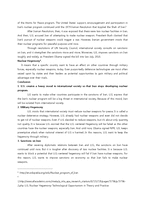[국제정치] 미국이 중동정책 고찰(영문)
 등록일 / 수정일
등록일 / 수정일 페이지 / 형식
페이지 / 형식 자료평가
자료평가 구매가격
구매가격
- 2011.03.14 / 2019.12.24
- 10페이지 /
 docx (MS워드 2007이상)
docx (MS워드 2007이상) - 평가한 분이 없습니다. (구매금액의 3%지급)
- 1,600원
최대 20페이지까지 미리보기 서비스를 제공합니다.
자료평가하면 구매금액의 3%지급!
 1
1 2
2 3
3 4
4 5
5 6
6 7
7 8
8 9
9 10
10
추천 연관자료
- 목차
-
USFP toward Middle East
Ⅰ. Introduction
Ⅱ. Gulf war& Iraq war
Ⅲ. US hegemony on Palestine-Israel conflict
Ⅳ. US‘s hegemony related Iran’s nuclear development.
Ⅴ. Historical background about nuclear issue
Ⅵ. Conclusion
Reference
- 본문내용
-
4) The contradictory actions against US moralism.
US declared that they are defending values of freedom and human rights. And they claim that war is necessary for defending these values. But this claim is contradictory to their actions. In the months prior to the terrorist attacks, the US had already walked away from several international treaties, including the Kyoto climate accord and an agreement to eliminate land mines.
These contradictory actions against to US idealism and moralism show the hegemony to strengthen the physical power.
Conclusion.
The explicit justification for the war in Afghanistan is 'war against terrorism'. However, when seeing the arbitrary change of government, the struggles over oil and mineral resources and contradictory actions against universal values, US invasion of Afghanistan has hegemonic character.
In terms of US hegemony character about the US foreign policy, as US showed their hegemony in Afghanistan war, US showed their hegemony character in Persian Gulf War in 1991 and Iraq War in 2003. Of course Persian Gulf War in 1991 and Iraq War in 2003 had different US hegemony character and extent of US hegemony character. Although these two wars had different US hegemony character and extent of US hegemony character, we could discover US hegemony character in these two wars. First examine Persian Gulf War 1991 in terms of US hegemony.
Ⅱ. Gulf war& Iraq war
On August 2, 1990, Iraq invaded and occupied Kuwait. UNSC tried to resolve the situation peacefully to avoid armed conflict. On August 3, the UNSC called for Iraq to withdraw from Kuwait, and On November 29, the UNSC declared that if Iraq did not withdraw from Kuwait by January 15, 1991, they authorized using of force against Iraq. However, Hussein refused to withdraw Iraqi forces from Kuwait. On January 16–17, 1991 the multinational coalition force led by the US air offensive invaded Iraq and the Persian Gulf War began.
Within hours of Iraq attack on neighboring Kuwait, George H. W. Bush who had favored diplomatic engagement with Iraq for several years began lining up European, Asian, and Middle Eastern allies. He then ordered the biggest deployment of soldiers and materials since the Vietnam War. Because George H. W. Bush was able to build a strong international coalition before mounting the Persian Gulf War in 1991, Persian Gulf War in 1991 had a weak US hegemony character. Although Persian Gulf War in 1991 showed relatively a weak US hegemony character, this war is case that US exercise their hegemony because George H. W. Bush wanted to has a great deal of influence on Iraq. He wanted to exercise US influence over the Iraq.
After 9. 11 terror, in Jan. 2002 bush made a axis of evil speech and presented Bush doctrine that the United States is justified in going to war preemptively against any group that potentially threatens the country or its allies and that it will do so alone of necessary and this Bush doctrine was the basis for the decision to go to Iraq. George W bush attack on Iraq on the morning of March. 20. 2003 without UN approval, with unilateralism military power.
George W. Bush alleged that Hussein was an ally of Al-Qaeda so was related to 9.11 and possessed WMD (weapons of mass destruction). However this assertion was all clearly contradictory. He asserted that Hussein was an ally of Al-Qaeda so was related to 9.11. However a U.S. bipartisan commission investigated the September 11 attacks, and they said there was no evidence of a “collaborative operational relationship” between the Iraq Baath party’s Hussein government and al-Qaeda.
- 참고문헌
-
Reference
"Light Crude Oil (CL, NYMEX): Monthly Price Chart". Futures.tradingcharts.com. Retrieved 2008-09-10.
"Iraq to revive oil deal with China". International Herald Tribune. 2009-03-29.
Retrieved 2010-10-23.
USFP textbook
대외경제정책연구원 – 지역경제포커스 10-36호 “미국의 ‘포괄적 이란제재법’의 주요 내용 및 시사점” 2010년 8월 4일
한국중동학회- 미국의 아랍-이스라엘 분쟁에 대한 정책, 이종택, 2000
자료평가
-
아직 평가한 내용이 없습니다.
오늘 본 자료
더보기

최근 판매 자료
- 미쉬킨의 화폐와금융 요약 1장-5장
- 아시아나 항공 기업의 가치사슬 분석
- [노사관계론] 현대자동차 파업을 통해 본 한국 노사관계의 발전방향
- 항공사 서비스품질 경영사례 분석 레포트
- [마케팅] 부산 아이파크 마케팅 전략
- [생산운영관리] TQM 세부사례(페덱스 도요타 제록스 포스코)
- [인적자원관리] 한국도로공사로 알아본 공기업의 현황과 문제점과 개선방안
- [한국도로공사 기업분석]한국도로공사 경영전략분석 PPT자료
- [생산운영관리] IKEA(이케아)의 생산운영 사례 분석(영문)
- 시장조사론_외생변수란 무엇이며, 왜 문제가 되는지 강의내용을 중심으로 작성하시오
저작권 관련 사항 정보 및 게시물 내용의 진실성에 대하여 레포트샵은 보증하지 아니하며, 해당 정보 및 게시물의 저작권과 기타 법적 책임은 자료 등록자에게 있습니다. 위 정보 및 게시물 내용의 불법적 이용, 무단 전재·배포는 금지됩니다. 저작권침해, 명예훼손 등 분쟁요소 발견시 고객센터에 신고해 주시기 바랍니다.









